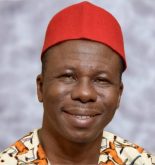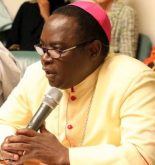By Abga Jalingo
Democracy, the government of the people, by the people and for the people, is having a field day and may never vanish from the surface of the earth.
However-so-be-it that democracy has established it’s widely accepted values, it does not in anyway erode the truism of the existence of alternative interpretation of society and humanism that even pre-dates democracy.
Ubuntu is one of such.
Ubuntu is a traditional African concept. The word Ubuntu comes from the Nguni Bantu language, and can be roughly translated as “humanity towards others.”
According to several African scholars who have attempted to theorize on the term, Ubuntu embodies all those virtues that maintain harmony and the spirit of sharing among the members of a society. It implies an appreciation of traditional beliefs, and a constant awareness that an individual’s actions today are a reflection on the past, and will have far-reaching consequences for the future.
A person with Ubuntu knows his or her place in the universe and is consequently able to interact gracefully with other individuals. One aspect of Ubuntu is that, at all times, the individual effectively represents the people from among whom he or she comes, and therefore tries to behave according to the highest standards and exhibit the virtues upheld by his or her society.
The ethical values of Ubuntu include respect for others, helpfulness, community, sharing, caring, trust and unselfishness. Ubuntu underscores the importance of agreement or consensus, and gives priority to the well-being of the community as a whole.
Since 1980, late Zimbabwean, historiographer, educator, journalist, author, and African nationalist, “Stanlake Samkange,” attempted to systematize an African epistemology in Hunhuism or Ubuntism.
He emphasized three maxims which shape the philosophy of Hunhuism or Ubuntuism:
According to Samkange’s explanation of the Ubuntu philosophy:
“To be human is to affirm one’s humanity by recognizing the humanity of others and, on that basis, establish respectful human relations with them.
“If and when one is faced with a decisive choice between wealth and the preservation of the life of another human being, then one should opt for the preservation of life.”
The King owes his status, including all the powers associated with it, to the will of the people under him.
These, Samkange said, were the “principles deeply embedded in traditional African political philosophy.”
According to Samkange, sharing is only one of many virtues encompassed within unhu.
In the ethical domain of unhu:
All visitors are provided for and protected in every home they pass through, without the expectation of payment, and do not need to carry provisions when they are on the road, as long as they dress in a respectable manner.
Every individual who is aware of the presence of a visitor within a locality should try his or her best to make that visitor comfortable.
It is taboo to call elderly people by their given names; instead they are called by their surnames to banish individualism and replace it with a representative role.
The individual’s identity is replaced by a larger societal identity. Every individual represents a family, village, district, province and region.
This requires the individual to behave according to the highest standards and to exhibit, to the greatest possible degree, the virtues upheld by his or her society.
A key concept associated with ubuntu, or unhu, is behavior and interaction in the context of various social roles.
For example, a daughter-in-law traditionally kneels down when greeting her parents-in-law and serves them food, as a sign of respect. She maintains the highest standards, because her behavior is a reflection on her family and on all the women raised in that family. The daughter-in-law does this as part of the ambassadorial function that she assumes at all times. A woman’s deference to a husband or brother does not imply that the woman is subordinate, only that she possesses unhu and knows the proper attitude and behavior for each social circumstance.
Under unhu, children are never orphans, since the roles of mother and father are, by definition, not vested in a single individual with respect to a single child. Furthermore, a man or a woman with unhu will never allow any child around him or her to be an orphan.
The concept of unhu is also essential to traditional African jurisprudence and governance. Under unhu, a crime committed by one individual against another extends far beyond the two individuals and has far-reaching implications for the people from among whom the perpetrator of the crime comes. Unhu jurisprudence supports remedies and punishments that tend to bring people together. A crime of murder might be remedied by creating a bond of marriage between the families of the victim and the accused, in addition to punishing the perpetrator both inside and outside his social circles.
The family and the society from which the criminal came are regarded as a sort of “tertiary perpetrator,” and are punished with a fine and social stigma that can only be absolved by many years of demonstrating unhu or ubuntu.
A leader who has unhu is selfless, consults widely and listens to his subjects.
He or she does not adopt a lifestyle that is different from his subjects, but lives among them and shares what he owns.
A leader who has unhu does not lead but allows the people to lead themselves. Forcefully imposing his or her will on his people is incompatible with unhu, Samkange explained.
During the 1990s, the concept of ubuntu was adapted as an ideology by post-apartheid South Africa, as a vehicle to bring about harmony and cooperation among its many racial and ethnic groups and in attempting to explain Ubuntu, Archbishop Desmond Tutu, in “No Future Without Forgiveness”, said:
“Ubuntu is very difficult to render into a Western language. When we want to give high praise to someone we say, “Yu u nobuntu”; “Hey, so-and-so has ubuntu.” Then you are generous, you are hospitable, you are friendly and caring and compassionate. You share what you have. It is to say, “My humanity is caught up, is inextricably bound up, in what is yours.” …We say, “A person is a person through other persons.” …A person with Ubuntu is open and available to others, affirming of others, does not feel threatened that others are able and good, for he or she has a proper self-assurance that comes from knowing that he or she belongs in a greater whole and is diminished when others are humiliated or diminished, when others are tortured or oppressed. …To forgive is not just to be altruistic. It is the best form of self-interest. What dehumanizes you inexorably dehumanizes me. Forgiveness gives people resilience, enabling them to survive and emerge still human despite all efforts to dehumanize them.”
The African concept of Ubuntu, to a Western Humanist, might be interpreted as an effective social ethic or rule of conduct, or simply as a description of the human situation.
In traditional African thought, Ubuntu
has a profoundly religious significance. “Persons” includes not only living human beings, but ancestors who have already died and children who have not yet been born.
Ubuntu or Unhu embodies deep respect for ancestors, and includes all the attitudes and behaviors necessary not only for a harmonious life with other individuals on earth, but with ancestors in the world beyond death and with those who will live on earth in the future.
Every individual is the fruit of his or her ancestors, and will become the ancestor of all future descendants.
Ubuntu implies an appreciation of traditional beliefs, and a constant awareness that an individual’s actions today are a reflection on the past, and will have far-reaching consequences for the future.
Those who uphold Ubuntu throughout their lives will, in death, achieve a unity with those still living.
In Western thought, an individual is a pre-existent and self-sufficient being and exists prior to, separately and independently from the rest of the community or society.
Ubuntu defines the individual only in terms of his or her relationships with others in the community. As these relationships change, the character of the individual changes. An individual constitutes multiple personalities corresponding to his or her various roles in society.
Former South African President, Nelson Mandela, speaking in an interview incorporated in a promotional video for the Ubuntu Linux distribution, also said:
“A traveler through a country would stop at a village and he didn’t have to ask for food or for water. Once he stops, the people give him food, entertain him. That is one aspect of Ubuntu but it will have various aspects.
“Ubuntu does not mean that people should not address themselves. The question therefore is: Are you going to do so in order to enable the community around you be able to improve?
Give your answer to Mandela and remember to imbibe the Ubuntu philosophy in all thy doings.
This is what was not allowed to evolve. We were told and continue to be told that everything about us is evil, yet we are not. But if we return to our roots, our branches may flourish better and nourish us best.
(An edited old article for your reading pleasure and a reminder of our Africanity.)
Citizen Agba Jalingo is an activist and public affairs analyst.




